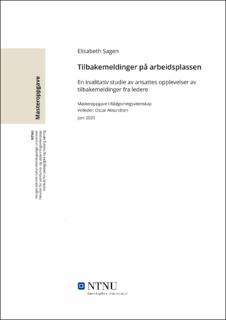| dc.contributor.advisor | Amundsen, Oscar. | |
| dc.contributor.author | Sagen, Elisabeth. | |
| dc.date.accessioned | 2021-09-28T17:38:16Z | |
| dc.date.available | 2021-09-28T17:38:16Z | |
| dc.date.issued | 2020 | |
| dc.identifier | no.ntnu:inspera:57984488:10009130 | |
| dc.identifier.uri | https://hdl.handle.net/11250/2784678 | |
| dc.description.abstract | Tittel: Tilbakemeldinger på arbeidsplassen.
Bakgrunn: Rette større fokus mot ansattes opplevelser av tilbakemelding i organisasjoner. Her som et kommunikativt og relasjonelt fenomen.
Formål: Formålet med studien har vært å få innsikt i ansattes egne opplevelser og kunnskap om tilbakemeldinger. Siden mye av organisasjonslitteraturen legger opp til at ledelsen vet best hvordan en organisasjon bør utvikles, kan det være hensiktsmessig å innhente og analysere kunnskap om ansattes egne opplevelser. Ved å trekke inn teoretiske perspektiver fra både organisasjonsteori og rådgivningsvitenskap, har det vært et mål å bidra med en nyansert forståelse av fenomenet tilbakemelding til forskningsfeltet.
Studiens problemstilling: «Hvordan opplever ansatte tilbakemeldinger fra ledere?»
Metode: I studien ble kvalitative semistrukturerte intervju brukt for å besvare problemstillingen. Utvalget besto av åtte ansatte ved en norsk industribedrift. Fortolkende fenomenologisk analyse var utgangpunktet for transkribering og analysen. Prosessen kan imidlertid beskrives som en abduktiv arbeidsmetode, hvor visse teoretiske inspirasjonskilder lå til grunn for måten jeg nærmet meg materialet på. Identifiseringen av temaene skjedde dermed i en bevisst og ubevisst alternering mellom teori og empiri.
Funn: Gjennom analysen kom jeg frem til fire overordnede tema:
• Betydningen av gjensidighet i relasjonen
• Tilgang på tilbakemeldinger
• Betydningen av lite eller ingen tilbakemeldinger
• Utvikling gjennom tilbakemeldinger
Konklusjon: Deltakerne i studien fortalte om ulike opplevelser av tilbakemeldinger fra lederne sine. For eksempel tyder funnene i analysen på at tilbakemeldinger flyter bedre når en åpen, direkte og gjensidig kommunikasjon ligger til grunn i relasjonen. I tillegg kan verbal kommunikasjon gi en bedre opplevelse og forståelse av tilbakemeldinger enn hvis de går via epost. Dette kan ses i sammenheng med at kaffepausen oppleves som en sentral plattform for tilbakemeldinger, hvor det oppleves at den gir mulighet til å få og gi tilbakemeldinger fortløpende, i tillegg til at den har en friere atmosfære. Det kommer også frem i funnene at fravær av tilbakemeldinger eller utydelige tilbakemeldinger kan føre til usikkerhet. I tillegg kommer det frem at selv tilbakemeldinger som i utgangspunktet er positive, kan føre til usikkerhet dersom de oppleves å inneholde lite informasjon. | |
| dc.description.abstract | Title: Workplace feedback.
Background: Directing focus towards employees experience with feedback in organizations. Here as a communicative and relational phenomenon.
Purpose: The purpose of this study has been to acquire insight in the employees own experience and knowledge about workplace feedback. Since the majority of the organizational literature is written from a perspective where it is assumed that the management knows best how the organization should be developed, it might be beneficial to acquire and analyze knowledge about the employees experience. By including theoretical perspectives from both organizational literature and counselling science, it has been a goal to contribute with a nuanced understanding of the phenomenon feedback to the research field.
Problem formulation: “How do employees experience feedback from the managers?”
Method: In the study, qualitative semi-structured interviews were used to answer the research question. Eight employees at a Norwegian industrial company were interviewed. The interviews were transcribed and analyzed on the basis of interpretive phenomenological analysis. However, the process can be described as abductive, where certain theoretical sources of inspiration was the basis for how the material was approached. Therefore, the identification of the themes took place in a conscious and unconscious alternation between theory and collected data.
Findings: Throughout the analysis four overarching themes were identified:
• Significance of reciprocity in the relation
• Access to feedback
• Significance of little or no feedback
• Development through feedback
Conclusion: The participants in the study described different experiences with feedback from their managers. One of the findings in the analysis, indicate a correlation between the experience of management feedback and the experience of communication in the relations, where the experience of reciprocity in the relationship is a factor for the feedback flow. In addition to this, verbal communication can give a better understanding and perception of the feedback compared to the use of emails. This can be seen in association with the experience of the coffee break as a central feedback platform, where the relaxed atmosphere makes it possible to fluently receive and give feedback. It was also found that lack of feedback or unclear feedback might lead to uncertainty for the employees. In addition to this, it was found that even feedback that is essentially positive can lead to uncertainty if perceived to be superficial. | |
| dc.language | | |
| dc.publisher | NTNU | |
| dc.title | Tilbakemeldinger på arbeidsplassen | |
| dc.type | Master thesis | |
